Answer these simple questions and we will find you the BEST prices
Which type of solar quotes do you need?
It only takes 30 seconds
100% free with no obligation

Get Free quotes from insulation specialists near you

Save money by comparing quotes and choosing the most competitive offer

The service is 100% free and with no obligation
- GreenMatch
- Insulation
- Insulation Costs
House insulation costs in the UK 2026

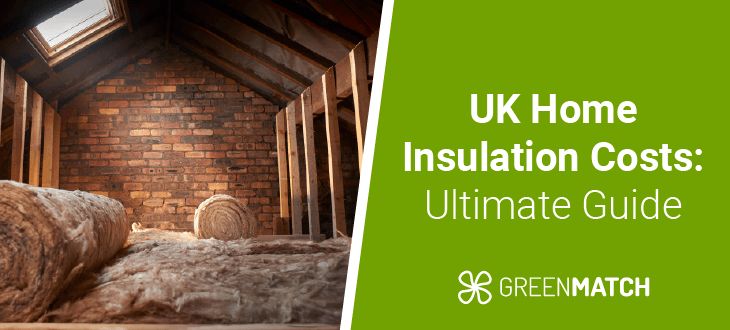
- The combined cost of insulating your cavity walls, floor, roof, or loft will be around £12,930 for a 3-bedroom semi-detached house in the UK.
- To make insulation more accessible, VAT on home insulation costs has been removed up until 31st March 2027.
- Homes with wall, underfloor, and loft insulation can save up to £630 - £ 730 yearly on their energy bills.
With soaring energy bills leaving homeowners across the UK in a stump, it is becoming apparent that poor home insulation might just be a far more sinister culprit than realized. The good news is that home insulation is a highly effective means of reducing annual energy bills whilst drastically improving the overall energy efficiency of your home.
Full home insulation - complete with walls, underfloor, and loft or roof insulation can save a standard 3-bedroom semi-detached household up to £730 on annual energy bills, as well as slashing your home's carbon footprint by up to 1.7 tonnes every year.
The UK government also offers two key insulation grants - namely the ECO4 and the Great British Insulation Scheme - to further help low-efficiency and low-income households with the installation cost of insulating homes. Those who qualify can enjoy full or partial coverage of home insulation projects.
If you’re wondering; how much does it cost to insulate a house? Then you're in the right place. In this guide, we will break down the expected costs and savings for various forms of home insulation, as well as existing grants that can potentially reduce your investment costs.
Ready to get your home insulated? Let GreenMatch UK free you from countless hours of research and vetting of professional installers. Through our wide-spanning network of accredited installers right in your area, you can jump ahead of the market with the best bargains. Simply fill out our 30-second form and receive up to 3 free quotes on home insulation, no charges or obligations involved. Click below to begin!
- Describe your needs
- Get free quotes
- Choose the best offer
It only takes 30 seconds



How much does insulation cost?
As a ballpark estimate, home insulation costs - complete with cavity walls, under floors, and roof or loft - can sit around £12,930 for a standard 3-bedroom semi-detached home in the UK.
The cost of insulation heavily depends on the unique circumstances of your home, your budget, and installation complexity amongst other factors.
Here is an overall breakdown of the associated costs and savings you could expect for each type of home insulation in 2026:
| Insulation type | Typical installation costs | Energy bill savings (£/year) | CO2 savings (kgCO2/year) |
|---|---|---|---|
| Cavity walls (270mm) | £2,700 | £280 | 650 |
| Solid walls (internal) | £7,500 | £380 | 880 |
| Solid walls (external) | £12,000 | £380 | 880 |
| Floors (suspended timber) | £4,700 | £80 | 185 |
| Lofts | £930 | £270 | 620 |
| Windows | < £15,000 | £165 | 375 |
| Doors | £840 – £4,325 | £45 | - |
| Piping & water tanks | £38 | £226 | 715 |
Roof & loft insulation costs
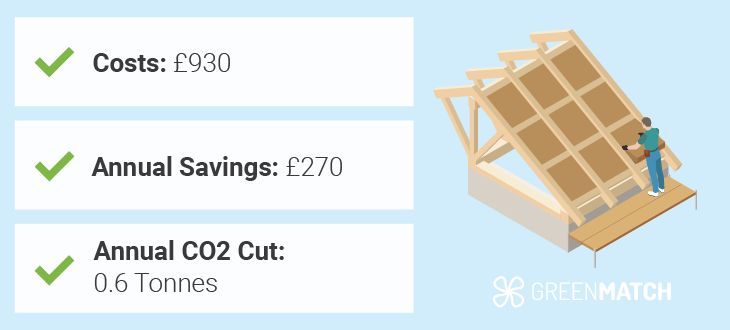
Roof and loft insulation costs normally sit at around £930 for a 3 bedroom semi-detached home in the UK, yet bring impressive annual energy bill savings of up to £270 year on year. This gives roof and loft insulation one of the quickest payback periods of just over three years.
Uninsulated roofs and lofts account for over a quarter of the heat that is lost in a home. With proper insulation, you drastically improve your home's ability to retain heat, whilst also reducing your carbon emissions by up to 0.6 tonnes annually.
There are four main types of material for roof or loft insulation, each with varying costs and perks to consider:
- Blanket insulation: The most popular and easy method of loft insulation, also making it suitable for DIY installation. Normally comes in the form of rolls or batts made of mineral wool (glass or rock), fibreglass, or sheep’s wool. Blanket insulation is also cost-effective, with materials like fibreglass costing no more than £10 per m2.
- Loose-fill insulation: Useful when insulating awkward shapes and uneven joists, these are shredded fibres that can be spread across an entire loft or blown into crevices. The most popular material is cellulose, a cost-effective insulator made from recycled paper costing around £10 - £12 per m2. Other materials include shredded fibreglass and mineral wool variants.
- Sheet insulation: Comes in the form of rigid boards used when insulating the underside of roofs. The most common type is expanded (EPS) and extruded (XEPS) Polystyrene, with EPS being less dense than XEPS. Rigid sheet insulation can also be made from Polyisocyanurate and Polyurethane. Costs can vary depending on the insulation efficiency, with the lower end around £10 per m2 and the higher end around £17.5 per m2.
- Blown fibre insulation: For loft areas that are difficult to access, blown insulation is an effective solution in which specialist equipment is used to spray insulation into hard-to-reach areas. The most common form is Polyurethane (PUR) foam, but loose-fill insulation material can also sometimes be applied in the same way. Foam insulation tends to be one of the most expensive insulating materials at around £21.5 per m2 but is also one of the most durable and effective insulators on the market.
Floor insulation costs
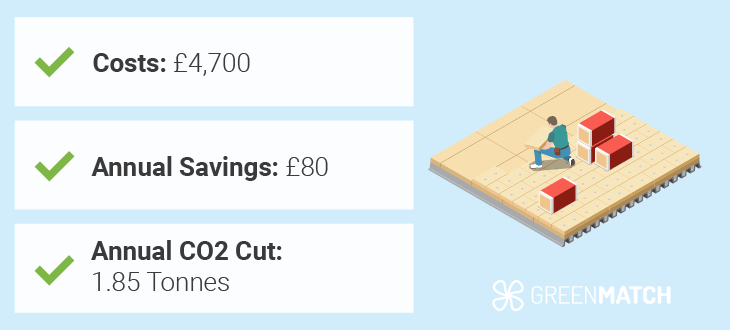
Floor insulation costs for an average UK home can cost up to £4,700 depending on the circumstances, with annual savings of around £80 on your energy bills. Normally, insulating just your ground floor is sufficient enough to keep your house warm.
Keep in mind that your costs might differ drastically based on your floor space, any existing insulation, and whether you have suspended-timber floors or concrete floors. As a general rule of thumb, concrete floors tend to cost more to insulate than suspended timber floors. Here are the main differences:
- Concrete floors can commonly be found in newer UK homes. It is best suggested to undergo insulation so when replacing or repairing your floors. Insulation can be added underneath the concrete or on top by placing rigid PIR boards and covering it with new flooring material.
- Suspended timber floors are more common in older UK homes. They are made of wooden floorboards that are laid on top of joists, which span the space above the building's foundation. This creates a gap underneath, allowing air to circulate, and preventing the floorboards from decaying.
Wall insulation costs
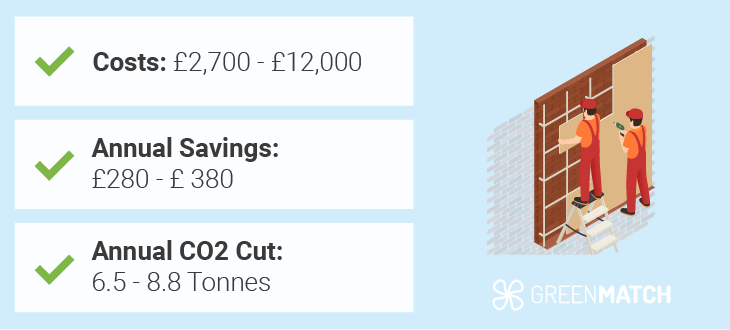
Wall insulation costs can vary significantly depending on the type of wall insulation you need. Cavity wall insulation can cost around £2,700, whereas internal to external solid wall insulation can range from £7,500 to £12,000. These prices can fluctuate based on any existing insulation, the length of external walls, and other factors. Nevertheless, properly insulated walls can save up to £280 - £380 on annual energy bills.
Not to mention, uninsulated walls account for an astonishing one-third of your home’s heat loss, making wall insulation a top priority for most homes. In the UK, properties often come with those different wall types:
- Solid walls: Most common in pre-1920 buildings, these are walls built with a single bricklayer. Such properties often require internal or external wall insulation, which tends to be a much more expensive job. While they are attractive, almost 97% of solid wall properties in the UK lack appropriate insulation.
- Cavity walls: More common with post-1920 buildings, these are when a property’s internal and external walls have a small gap or ‘cavity’ in between, which can then be easily filled with insulating material. Just over a quarter of cavity wall properties in the UK lack appropriate insulation.
Price of insulation materials
The price of insulation materials varies greatly depending on the type, but that’s good news as it means there is an option for every budget! The material cost is dependent on its insulation effectiveness, availability, and ease of production.
Here is a breakdown of insulation prices and uses to give you a general idea of what to expect when looking for the right option for your home:
| Material type | Insulation uses | Average price (per m2) |
|---|---|---|
| Fibreglass | Lofts and roofs, floors, walls. | £10 |
| Polystyrene (EPS) | (External) walls, lofts and roofs, floors. | £10 |
| Cellulose | (Cavity) walls, attic and roof cavities. | £10 - £12 |
| PIR board | (Solid & cavity) walls, roofs, and floors. | £5 – £15 |
| Mineral wool (glass) | (Solid & cavity) walls, floors, lofts and roofs, piping. | £13 - £17.5 |
| Sheep wool | (Solid & cavity) walls, floors, lofts and roofs, piping. | £17.5 - £22 |
| Polyurethane (foam) | (Cavity) walls, floors, roofs, door and window perimeters. | £21.5 |
Generally, low U-value insulation materials and high R-value materials are the most effective in the thermal protection of your home.
Is it worth insulating my house?
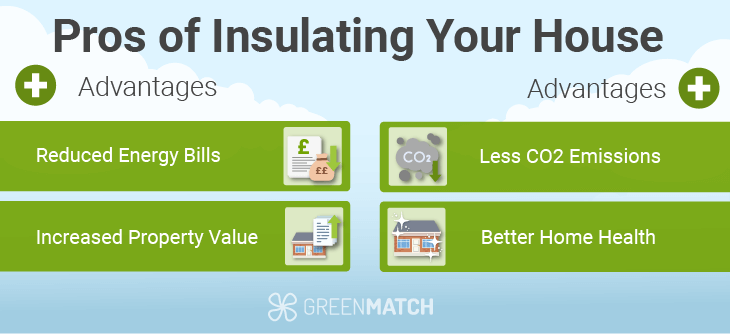
House insulation costs may seem daunting at times, but is worth it on all fronts. The wealth of benefits of proper home insulation include but are not limited to:
- Reduced energy bills: Insulating your home can bring about massive savings. By reducing almost two-thirds of your home's heat loss through insulated walls and loft, you could save up to £650 on your energy bills, year on year. This in turn has hugely positive implications on the environment.
- Less CO2 emissions: UK homes are notoriously inefficient, with domestic homes emitting more carbon dioxide than all the cars in the UK combined. By tackling this issue through proper insulation, a standard household can reduce its carbon emissions by up to 1.7 tonnes annually, benefitting both the environment and air quality.
- Increased property value: Homes with proper insulation are valued much higher on the property market than those lacking. Insulation raises your home's Energy Performance Certificate (EPC) rating, making your home more attractive to potential future buyers.
- Better home health: Homes that are cold and drafty are a breeding ground for dampness. This in turn fosters mold growth and rot, which is harmful to your home's structural integrity as well as your health. Insulated homes have a dry healthy inner climate that keeps your home structurally safe and promotes your health and wellbeing.
Are there grants to reduce the cost of insulation?
There are several grants and schemes available in the UK that aim to assist low-efficiency and low-income households with improving their home insulation. Households that qualify can receive full or partial coverage for insulation upgrades, as well as assistance for further home energy efficiency improvements (in the case of ECO4).
The two nationwide schemes that are currently ongoing are The Great British Insulation Scheme and the ECO4 scheme. Each comes with its own set of provisions. Check the table below for a breakdown:
| Scheme | Duration | Provisions |
|---|---|---|
| The Great British Insulation Scheme | 31 March 2023 - 31 March 2026 | A single insulation measure per household. |
| The ECO4 Scheme | 1 April 2022 - 31 March 2026 | Home insulation, boiler upgrade and repair, and renewable heating systems. |
The Great British Insulation Scheme can be applied directly via the official government portal, whereas the ECO4 scheme requires you to contact your energy provider to find out whether you are eligible for assistance.
Can I save money by insulating my house myself?
For those handy with DIY projects, insulating your home by yourself can further save you money. In general, insulating via a professional company can be two or three times more costly than purchasing insulating material and doing the job yourself.
Of course, the final costs will vary depending on your home size, style, and installation complexity, but in general, it is highly recommended to work with a professional installer for multiple reasons:
- Safety: Home insulation often requires working with potentially hazardous materials that can be dangerous if in contact with skin, and potentially fatal if inhaled or ingested. Professional installers are well-equipped and trained to handle these materials expertly with industry-specific tools and protective gear.
- Professionality: Working with an accredited installer ensures the job is done correctly and up to government-set regulation standards. This is especially important when addressing structural issues with your home before insulating. Unsolved issues or poor workmanship can rack up a far larger cost down the line than just working with a professional from the beginning.
- Time: Professional installers are undoubtedly well versed in their craft, which means a larger insulation job can be handled at a fraction of the time it may take to do a DIY job. A professional installation is also far more likely to last effectively for a longer time.
Compare quotes from several companies for the best price
It’s important to compare insulation quotes from several companies for the best price, as this ensures you get the most value for your money.
By spending time and effort researching and communicating with insulation specialists, you can receive multiple quotes tailored to your home and then pick the most suitable insulation quote for your budget.
Nevertheless, there is no shortage of professional and accredited installation companies on the market, and the process of researching and vetting can see you spend countless hours on websites and phone calls. To alleviate this burden, leave the hard work to GreenMatch UK!
By simply filling out our 30-second form, you can receive 3 free home-tailored quotes from our network of trusted local installers; completely free of obligations. Get ahead of the competition with the best bargains and ensure your home receives the treatment it deserves.
- Describe your needs
- Get free quotes
- Choose the best offer
It only takes 30 seconds



FAQ
Insulation is expensive for a few reasons. The main reason has to do with the complexity of extracting, processing, and transporting raw materials to be made into insulation. High worker wages and the energy needs for processing are further exasperated by a huge demand for home insulation in the UK.
Nevertheless, there is a wide price range of insulating materials available on the market, suitable for all types of budgets. Existing UK government grants and schemes can also help further reduce costs for qualifying homes.
The cost of insulating the (cavity) walls, floors, and roof or loft of a 3-bedroom house in the UK can cost up to £12,930. However, it is important to keep in mind that your final costs will heavily depend on your specific home circumstances, any existing insulation, and installation complexity.
The most cost-effective way to insulate your house is to start with wall insulation. Uninsulated walls are responsible for up to one-third of your home’s heat loss, making it the single most detrimental element to your energy efficiency. Proper wall insulation can save your household up to £280 – £380 on annual energy bills.
Roof and loft insulation generally costs around £930 for a 3 bedroom semi-detached home in the UK, but can deliver impressive annual energy bill savings of up to £270. This gives it a quick payback time of just around three years.

Akif is a copywriter at GreenMatch since 2023. With a keen interest in community sustainability, green solutions and the role of digital media in identifying climate trends, he aims to hone in on his background in International Studies and Digital Media to provide a multidisciplinary approach to written content rooted in credible research and accuracy.
We strive to connect our customers with the right product and supplier. Would you like to be part of GreenMatch?

